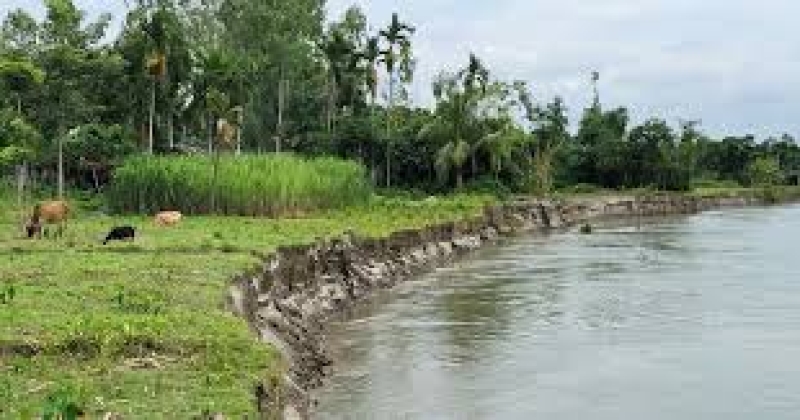- Israel Strikes Tehran with US Support Amid Nuclear Tensions |
- India Sees 9% Drop in Foreign Tourists as Bangladesh Visits Plunge |
- Dhaka Urges Restraint in Pakistan-Afghan War |
- Guterres Urges Action on Safe Migration Pact |
- OpenAI Raises $110B in Amazon-Led Funding |
Dharla Erosion Destroys Homes in Lalmonirhat

As the Dharla River silently eats away at its banks, hundreds in Lalmonirhat watch their homes and hopes vanish into the current.
As the water level rises and falls, severe erosion has occurred at 13 points along the river, leaving many families disoriented and desperate.
The hardest-hit areas are Debnathpara, Kurul, Megharam, Chaymatha and Char Budaru in Mogolhat Union; parts of Patgram; Gorkamandal and Char Gorkamandal in Naodanga Union of Phulbari Upazila; and Haker Bazar and Sardob in Holokhana Union.
Despite the worsening crisis, affected residents have alleged inaction on the part of the Water Development Board (WDB), which is responsible for preventive measures.
Abdar Hossain, 65, a farmer from Debnathpara, said he lost 16 bighas of land to the river—his last four just last week. “Now only a small hut is left, nearly 800 metres from the river. I have a family of seven. How will we survive?” he asked.
Bholanath Debnath, 60, from the same village, said five bighas of his land had already been swallowed by the river.
“The remaining land is also under threat. We were once a well-off family. Now we’re on the verge of homelessness,” he lamented.
Local UP member Jonab Ali said more than 100 bighas of land in Debnathpara have already been lost, and another 300 bighas are at risk.
“The Water Development Board comes to inspect, takes notes and leaves. No preventative work is being done. If they had started dumping geo bags earlier, much of this land could have been saved,” he claimed.
Char Gorkamandal in Phulbari is facing a similar fate.
Ala-Baks, 65, a farmer from the area, said, “All my two bighas of land are gone, and most of my house has collapsed. I’m now living by the roadside. I have no way to buy land or rebuild.”
Mahmuda Begum, 34, from the same area, said the river is now right behind her house. “It could swallow it at any time. I had three bighas of land—now there’s nothing,” she said, holding back tears.
Ayaz Uddin, a local UP member, said over 200 houses, including schools, madrasas, and Mujib Kella buildings, are under threat in the area. “In just one week, 15 houses and over 100 bighas of arable land have been lost. Still, no effective action has been taken,” he said.
Shunil Kumar, executive engineer of the Lalmonirhat Water Development Board, said they have sought allocation from higher authorities. “Once received, we will begin dumping geo bags and also implement permanent erosion control measures,” the UP member said.
Rakibul Hasan, another WDB engineer, said 7,000 geo bags were dumped in Char Gorkamandal last year, but the stock has now run out. “A new allocation has been requested."
Lalmonirhat Deputy Commissioner Rakib Haider said they have inspected the erosion-affected areas and directed the Water Development Board to take immediate measures to prevent further damage.
As the river continues to consume land and livelihoods, the residents of Lalmonirhat are left waiting—hoping for swift and decisive action before it’s too late, reports UNB.

